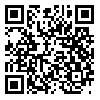Volume 8, Issue 3 (volume8, Issue 3 2020)
JCP 2020, 8(3): 24-37 |
Back to browse issues page
Download citation:
BibTeX | RIS | EndNote | Medlars | ProCite | Reference Manager | RefWorks
Send citation to:



BibTeX | RIS | EndNote | Medlars | ProCite | Reference Manager | RefWorks
Send citation to:
Khojir A, Kordnoghabi R, Rashid K, Yaghoobi A. Development of Wishful Thinking among 7 to 14-year-old Iranian Children and Adolescents. JCP 2020; 8 (3) :24-37
URL: http://jcp.khu.ac.ir/article-1-3354-en.html
URL: http://jcp.khu.ac.ir/article-1-3354-en.html
Hamedan, Bu-Ali sina university, Faculty of Economics and Social Sciences, Department of Psychology , rkordnoghabi@gmail.com
Abstract: (5027 Views)
Several studies have investigated wishful thinking or desirability bias in children and adults, while no research has been conducted for the evolution of wishful thinking during childhood and adolescence. The aim of the present research was to investigate the evolution of wishful thinking in Iranian children and adolescents aged from 7 to 14. This study was an evolutional one with a cross-sectional method. Participants were all students aged from 7 to 14 in public schools in the academic year of 2019-2020. The sample consisted of 240 individuals in 4 age groups and each group was made up of 30 females and 30 males selected by the convenience sampling method. The marked-card test, which has been designed as a web-based software, was used. The data were analyzed by a repeated measuring ANOVA. The results showed that wishful thinking among Iranian children did not decrease with age. Moreover, participants aged from 11 to 14 years indicated more severe bias than children from 7 to 10 years old in predicting unpleasant events, despite the perception of probabilities. Considering the effect of wishful thinking on the decision-making process, especially in predicting negative events and subsequently the occurrence of risky behaviors, further research would be necessary to find solutions for the awareness and balance of wishful thinking.
Type of Study: Research |
Subject:
Special
Received: 2020/11/24 | Accepted: 2021/01/9 | Published: 2021/01/9
Received: 2020/11/24 | Accepted: 2021/01/9 | Published: 2021/01/9
Send email to the article author
| Rights and permissions | |
 |
This work is licensed under a Creative Commons Attribution-NonCommercial 4.0 International License. |






